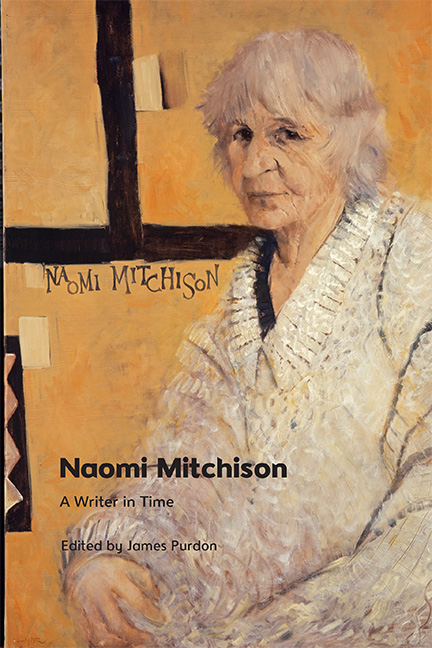Book contents
- Frontmatter
- Contents
- Acknowledgements
- Notes on Contributors
- Introduction
- 1 Naomi Mitchison’s Interwar Short Stories
- 2 ‘She had her hand on the plow’: Shame, Uncertainty and Transformation in The Corn King and the Spring Queen
- 3 Varieties of Sexual Experience: Naomi Mitchison, Mysticism and Gerald Heard
- 4 Scientific Temporalities in We Have Been Warned and ‘Beyond This Limit’
- 5 Send in the Clones? Naomi Mitchison and the Politics of Reproduction and Motherhood
- 6 From Argyll with Love: Naomi Mitchison and the Soviet Union
- 7 Fire or Blood? Aestheticising Resistance in Naomi Mitchison’s The Blood of the Martyrs
- 8 ‘The summoning urgent thing’: The Bull Calves and the Drive to Experiment at Mid-Century
- 9 Mitchison, Decolonisation and African Modernity
- Naomi Mitchison’s ‘Europe’
- Europe
- Bibliography
- Index
6 - From Argyll with Love: Naomi Mitchison and the Soviet Union
Published online by Cambridge University Press: 18 November 2023
- Frontmatter
- Contents
- Acknowledgements
- Notes on Contributors
- Introduction
- 1 Naomi Mitchison’s Interwar Short Stories
- 2 ‘She had her hand on the plow’: Shame, Uncertainty and Transformation in The Corn King and the Spring Queen
- 3 Varieties of Sexual Experience: Naomi Mitchison, Mysticism and Gerald Heard
- 4 Scientific Temporalities in We Have Been Warned and ‘Beyond This Limit’
- 5 Send in the Clones? Naomi Mitchison and the Politics of Reproduction and Motherhood
- 6 From Argyll with Love: Naomi Mitchison and the Soviet Union
- 7 Fire or Blood? Aestheticising Resistance in Naomi Mitchison’s The Blood of the Martyrs
- 8 ‘The summoning urgent thing’: The Bull Calves and the Drive to Experiment at Mid-Century
- 9 Mitchison, Decolonisation and African Modernity
- Naomi Mitchison’s ‘Europe’
- Europe
- Bibliography
- Index
Summary
Naomi Mitchison’s writing provides us with a remarkably clear albeit esoteric window into the uniquely turbulent political climate of mid-century Britain, and not least into the personal lives of the wealthy British left and their struggle with and for socialism. The socialist alternative to capitalism in the shape of the Soviet Union loomed large in the contemporary left imaginary, but it is Mitchison’s direct confrontation with Soviet reality on which this chapter focuses. From the 1930s to the 1950s in particular, communism’s internationalism and irreverence for tradition was attractive to a great many artists, musicians and writers on the left. Mitchison travelled twice to the USSR in this period. In 1932, she went as a member of the Society for Socialist Information and Propaganda (SSIP), an arm of the Fabian Society, to observe and report back on social progress in action. Then in 1952 she travelled as a delegate of the Authors’ World Peace Appeal (AWPA) with the aim of fostering peaceful exchange across the Iron Curtain. In the 1930s Mitchison’s allegiance was squarely in line with those Labour MPs calling for a united front – an alliance of leftist and leftish political parties – against rising fascism across Europe, but she was fascinated by the socially liberating potential of Soviet-style communism, even if ultimately she would not be converted from her personal loyalty to Labourite social democracy and the gradualism propounded by the majority of people in her milieu.
Her upper-class vantage point afforded both the benefits and drawbacks of distance from the sites of capitalist exploitation of the working class. It affected her views in similar ways to the travelogue style of the Etonian George Orwell in The Road to Wigan Pier (1937). But her journey, as we experience it both in her fiction and her autobiographical writing, is more complex. Like her fictional avatars, she opens herself up to several cross-class ‘intersubjective relationships’ which, as Nick Hubble has discussed, transform her, or her protagonist’s identity. The USSR was ‘The Debatable Land that lies between here and fairyland’ from where ‘one came back changed’.
- Type
- Chapter
- Information
- Naomi MitchisonA Writer in Time, pp. 89 - 107Publisher: Edinburgh University PressPrint publication year: 2023



